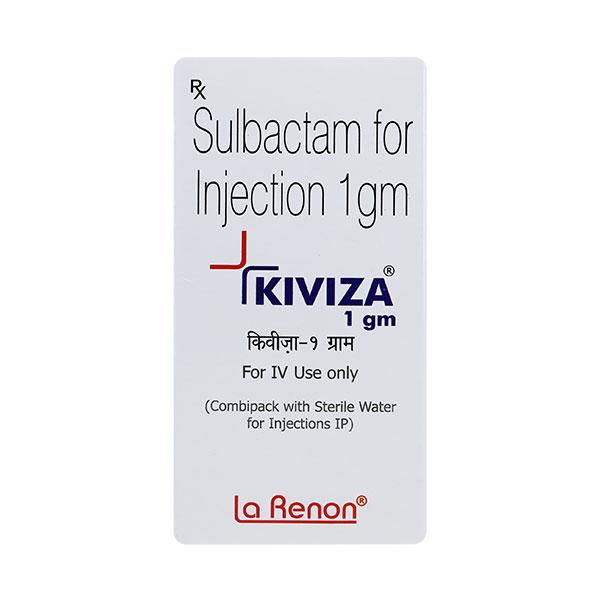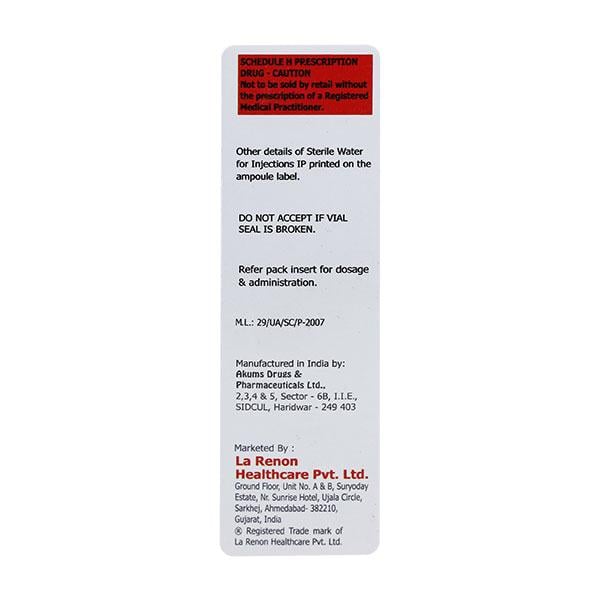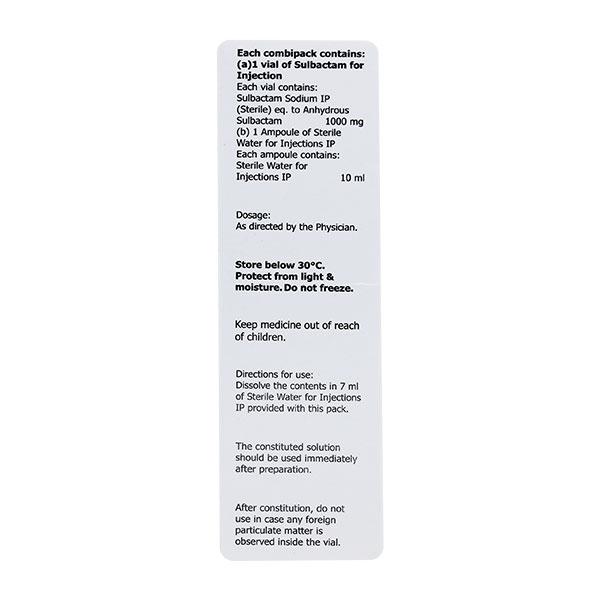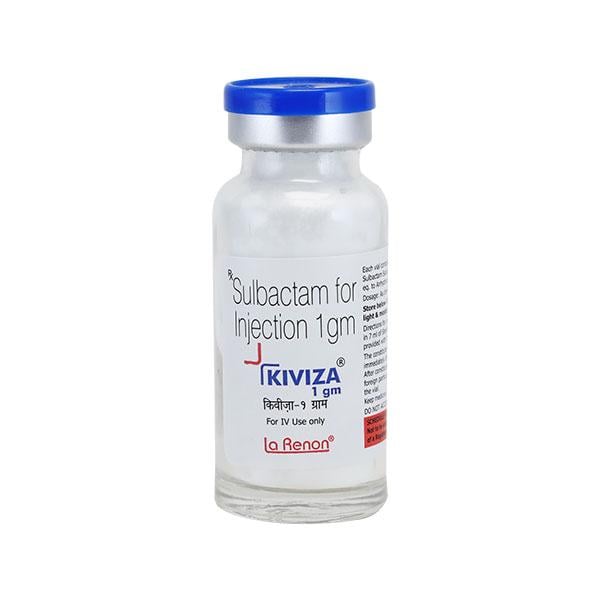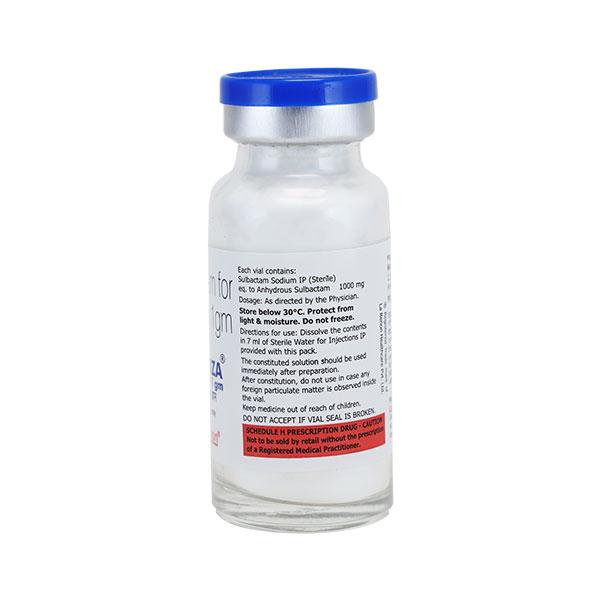

Netmeds First Membership
Quick Links
Introduction About KIVIZA 1GM INJECTION
KIVIZA 1GM INJECTION is used in the management of severe bacterial infections in combination with other antibiotics. It is one of the most powerful antibiotics used against the strains of Acinetobacter baumannii which is resistant to conventional medicines. It contains Sulbactam which blocks beta-lactamase enzymes produced by bacteria, that allows antibiotics to work better against resistant bacteria.
KIVIZA 1GM INJECTION should be used only under medical supervision. It will be administered to you into the veins or muscles by a trained medical professional. Before receiving KIVIZA 1GM INJECTION, inform your doctor if you have any kidney problems, electrolyte disorders, epilepsy, meningitis or if you are pregnant or breastfeeding as a precaution.
The most common side effects of receiving KIVIZA 1GM INJECTION are pain at injection site, diarrhea, dizziness, headache, low WBC, RBC and platelets, indigestion, excess gas and loss of appetite. Consult your doctor if any of these side effects trouble you.
Uses Of KIVIZA 1GM INJECTION
- Management of severe bacterial infections
- Effective against the strains of Acinetobacter baumannii which is resistant to conventional medicines
How KIVIZA 1GM INJECTION Works
KIVIZA 1GM INJECTION contains sulbactam which is a beta-lactamase inhibitor. It works by blocking the action of enzymes called beta-lactamases that are produced by some bacteria to resist certain antibiotics. By inhibiting these enzymes, sulbactam allows antibiotics (like penicillins) to remain effective against bacteria that would otherwise be resistant, helping to manage infections more effectively.
How to use KIVIZA 1GM INJECTION
KIVIZA 1GM INJECTION should be given to you only by a doctor or a nurse into the veins (as intravenous injection or into the muscles as intramuscular injection.
Your doctor will decide the correct dose and dosing frequency for you based on your age, body weight and health condition. Do not skip doses to ensure maximum protection against the infection.
Side Effects Of KIVIZA 1GM INJECTION
Common
- Pain at injection site
- Diarrhea
Uncommon
- Dizziness
- Headache
- Indigestion
- Nausea, vomiting
- Loss of appetite
- Flatulence or bloating
Consult your doctor immediately if you experience any of the following side effects after taking KIVIZA 1GM INJECTION:
- Severe allergic reactions (such as skin rashes with itching, swelling of the face, lips, throat, and difficulty in breathing and swallowing)
- Increased bleeding time, bleeding under the skin causing small red spots on the skin
- Low RBC, WBC and platelet counts causing increased infections, fever, flu-like symptoms, tiredness, weakness, bleeding, etc
How To Manage Side Effects
Diarrhea
Drink lots of fluids, such as water or fruit juices to keep yourself hydrated. Do not take any medicine on your own to manage diarrhoea. Contact your doctor if your diarrhoea did not improve.
Dizziness Or Drowsiness
Try to rest and relax. Get enough sleep. Avoid driving or operating any machines while you are feeling dizzy. Contact your doctor if your dizziness did not improve.
Injection Site Reactions
To manage injection site pain after an injection, you can apply a cool, damp cloth or ice pack wrapped in a towel to the area for 10-15 minutes to reduce swelling and discomfort. Keeping the arm moving and gently massaging the area can also help ease stiffness and soreness. Avoid tight clothing around the injection site to prevent additional irritation.
Warning & Precautions
Pregnancy
Monitoring requiredThere are no adequate study results regarding the use of sulbactam injection among pregnant women. Therefore, KIVIZA 1GM INJECTION should be used in pregnant women only if considered necessary by the physician.
Breastfeeding
Monitoring requiredSulbactam injection can pass through breast milk. Therefore, KIVIZA 1GM INJECTION should be used in breastfeeding women only if considered necessary by the physician.
Driving and Using Machines
Use with CautionDo not drive or handle any heavy tools or machines if your ability is affected by KIVIZA 1GM INJECTION.
Kidney
Use with CautionKIVIZA 1GM INJECTION should be used with caution in patients with kidney problems. Therefore, consult your doctor for advice before receiving it.
Allergy
ContraindicatedTalk to your doctor before receiving KIVIZA 1GM INJECTION if you are allergic to Sulbactam.
Use In Pediatrics
Monitoring requiredKIVIZA 1GM INJECTION should be used in children and adolescents (aged below 18 years) only if considered necessary by the physician. The safety and effectiveness of sulbactam injection have not been established in children aged 1 year or below. Therefore, consult your doctor for advice.
Use In Geriatrics
Use with CautionKIVIZA 1GM INJECTION should be used with caution in elderly patients. Therefore, consult your doctor for advice.
Others
Before receiving KIVIZA 1GM INJECTION, inform your doctor if you:
- Have electrolyte disturbances
- Have epilepsy
- Have meningitis (inflammation of the layer covering the brain)
Interactions
A. Drug-Drug interactions:
- Other antibiotics (such as amikacin, gentamicin, netilmicin, tobramycin, mezlocillin, piperacillin, cefotaxime, or penicillin G)
- Probenecid (an anti-gout medicine)
Overdosage:
KIVIZA 1GM INJECTION will be given to you only by a doctor or nurse in a hospital and so it is unlikely to receive an overdose. However, if you experience any unusual symptoms, consult your doctor immediately or visit the nearby hospital.
Synopsis
| Drug | : | Sulbactam |
| Pharmacological Category | : | Beta-Lactamase Inhibitor |
| Therapeutic Indication | : | Bacterial infections |
| Dosage Forms | : | Injection |
More Information
Storage
- Keep KIVIZA 1GM INJECTION out of reach of children
- Store KIVIZA 1GM INJECTION at room temperature
FAQs About KIVIZA 1GM INJECTION
Q: What is KIVIZA 1GM INJECTION used for?
A: KIVIZA 1GM INJECTION is used in the management of severe bacterial infections in combination with other antibiotics. It is one of the most powerful antibiotics used against the strains of Acinetobacter baumannii which is resistant to conventional medicines.
Q: How KIVIZA 1GM INJECTION works?
A: KIVIZA 1GM INJECTION contains sulbactam which is a beta-lactamase inhibitor. It works by blocking the action of enzymes called beta-lactamases that are produced by some bacteria to resist certain antibiotics. By inhibiting these enzymes, sulbactam allows antibiotics (like penicillins) to remain effective against bacteria that would otherwise be resistant, helping to manage infections more effectively.
Q: How KIVIZA 1GM INJECTION administered?
A: KIVIZA 1GM INJECTION should be given to you only by a doctor or a nurse into the veins (as intravenous injection or into the muscles as intramuscular injection.
Q: Is KIVIZA 1GM INJECTION safe?
A: KIVIZA 1GM INJECTION is safe at doses prescribed by the physician. However, it may cause are pain at injection site, diarrhea, dizziness, headache, low WBC, RBC and platelets, indigestion, excess gas or loss of appetite in some individuals. Consult your doctor if any of these side effects trouble you.
Q: What precautions must be followed while taking KIVIZA 1GM INJECTION?
A: KIVIZA 1GM INJECTION should be used only under medical supervision. It will be administered to you into the veins or muscles by a trained medical professional. Do not skip doses as it may make this medicine less effective in controlling infection further. Before receiving KIVIZA 1GM INJECTION, inform your doctor if are allergic to sulbactam, you have any kidney problems, electrolyte disorders, epilepsy, meningitis or if you are pregnant or breastfeeding as a precaution.
Q: Can KIVIZA 1GM INJECTION be used in children?
A: KIVIZA 1GM INJECTION should be used in children and adolescents (aged below 18 years) only if considered necessary by the physician. The safety and effectiveness of sulbactam injection have not been established in children aged 1 year or below. Therefore, consult your doctor for advice.
Q: How long will it take for KIVIZA 1GM INJECTION to show results?
A: Sulbactam injection typically starts working within a few hours, but noticeable improvement in infection symptoms might take 1 to 2 days, depending on the severity of the infection and the patient's overall health. However, this time period may vary depending upon the severity of the infection.
References
1. KD. Tripathi. Essentials of Medical Pharmacology. 8th Edition. Beta-Lactam Antibiotics. Page-775.
2. Sulbactam for injection. Matabac. Biocon Ltd. [Accessed on 27th August 2024] https://www.biocon.com/docs/prescribing_information/ccd/matabac_pi.pdf
3. Kiviza 1gm Injection 1'S. La Renon Healthcare Pvt Ltd. [Accessed on 28th August 2024] https://www.larenon.com/wp-content/uploads/2015/08/kiviza_one_page_lbl.pdf
Useful Diagnostic Tests
- Complete Blood Count (CBC)









